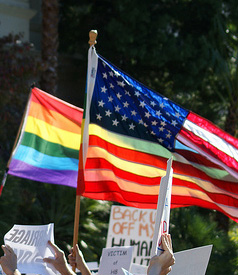Did you know that Truthout is a nonprofit and independently funded by readers like you? If you value what we do, please support our work with a donation.
On the first day of a landmark federal trial concerning the right of same-sex couples to marry, David Boies, the high-profile constitutional attorney representing Proposition 8 challengers, opened the plaintiff’s case by calling the couples who brought the suit to the witness stand to plead their case.
Following opening statements, Jeff Zarillo and Paul Katami, who have been partners for nine years, made impassioned pleas before the court for the right of all couples to marry.
“Marriage has a special meaning,” Zarillo said, according to a
Both men described how they felt discriminated against by Proposition 8, a ballot measure passed in November 2008 that defines marriage in the California Constitution as a union between a man and a woman. Civil rights groups and gay rights activists immediately challenged the measure, calling it unconstitutional and discriminatory. Defenders argue that Proposition 8 is the will of California’s voters, who passed the measure with a 52 percent majority. In May 2009, the American Foundation for Equal Rights, on behalf of two same-sex couples, filed suit against the state of California regarding the constitutionality of Proposition 8.
The suit itself has attracted increased attention because of the unconventional nature of the lawyers for the plaintiffs. Boies, a prominent Washington lawyer, who represented Al Gore in the disputed 2000 election against George W. Bush, teamed up with Theodore B. Olson, a stalwart of the conservative legal movement, who argued for Bush against Boies in the Supreme Court case that installed Bush as president – and won. Against this backdrop, Olson delivered the opening statement, and Boies followed with questioning of all four of the plaintiffs who brought the suit, focusing on their relationships, past instances of discrimination and the difference between domestic partnerships (legal under California law) and marriage.
“This isn’t a country about ‘us and them,'” Katami said. “My state is supposed to protect me, not discriminate against me.”
In cross-examination, the lead counsel for the defense, Charles J. Cooper, focused on the rights of heterosexual parents to protect their children from discussions of homosexual marriage. In his opening statement, Cooper also argued that same-sex couples could not satisfy a basic requirement of marriage.
“[The] basis of marriage is procreation,” he said. “It is a pro-child societal institution.”
Cooper also said that the defense would present evidence showing the harm of allowing same-sex couples to marry in states and countries where it is legal. Both sides plan to present an array of experts in the case, Perry v. Schwarzenegger, which is being held in the San Francisco courtroom of US District Judge Vaughn R. Walker. During the trial, which is expected to last for two or three weeks, attorneys will argue over topics such as whether homosexuality is “innate,” and the changing definition of marriage throughout history.
The trial started off with a setback to the plaintiffs. The Supreme Court, overruling Judge Walker, put a stay on a motion to have court proceedings televised on YouTube. A decision by the Supreme Court is expected by Wednesday afternoon.
In an apparent victory for the plaintiffs, however, Arnold Schwarzenegger, governor of California, will be the defending party in name only. Both he and his Attorney General Jerry Brown have declined to offer counsel for the defense, allowing Cooper, a private lawyer from Washington, along with a team from the conservative Alliance Defense Fund, to argue in their stead.
When questioned by the judge, the representative for the attorney general admitted that it was the attorney general’s position that Proposition 8 was unconstitutional.
In an opening statement for the plaintiff, Olson, who shocked conservatives around the nation by defending the right of marriage for same-sex couples, ” >statement. “It promotes mental, physical and emotional health and the economic strength and stability of those who enter into a marital union.”
He also drew parallels to the 1967 case Loving v. Virginia, in which the Supreme Court unanimously overturned a law barring interracial couples from marrying.
“Far from harming the institution of marriage, the elimination of discriminatory restrictions on marriage has strengthened the institution, its vitality, and its importance in American society today,” he said.
Following the defense’s cross-examination of Katami, the plaintiff’s called Kristin Perry, for whom the case is named, to the stand. In 2004, Perry married her partner, Sandra Stier, after Mayor of San Francisco Gavin Newsom ordered the city to allow same-sex couples to marry. That same year, the California Supreme Court voided all of the approximately 4,000 marriage licenses that were given out by the city clerk to same-sex couples.
“I’m 45 years old, in a relationship with one woman for 10 years, and I don’t have a name for our relationship,” Perry said, according to a live Twitter feed from In the midst of a nationwide attack on civil liberties, Truthout urgently needs your help. Journalism is a critical tool in the fight against Trump and his extremist agenda. The right wing knows this — that’s why they’ve taken over many legacy media publications. But we won’t let truth be replaced by propaganda. As the Trump administration works to silence dissent, please support nonprofit independent journalism. Truthout is almost entirely funded by individual giving, so a one-time or monthly donation goes a long way. Click below to sustain our work.
Speaking against the authoritarian crackdown
